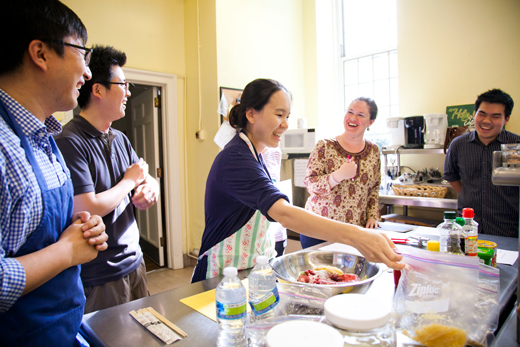When it comes to food and fellowship, the sign over Audrey Hindes' office door at Candler School of Theology best embodies her own philosophy:
"Love people, cook them tasty food."
Inside her office, an electric tea kettle is always close at hand, ready to bubble into service, alongside a basket of homemade blueberry muffins or whatever treat du jour she's brought to share.
An accomplished chef and cooking instructor, biblical scholar and a theological educator who is skilled in several languages, Hindes professes her passions for food, spirituality and hospitality with equal fervor.
To Hindes, it's all a form of nourishment. And as the program associate for academic and international support in Candler's Office of Student Programming, she delights in finding ways to neatly weave those interests together.
That's how the Office of Student Programming began offering free monthly cooking demonstrations last year designed to show Emory students how to eat delicious, healthy, affordable food — a popular series that continues this fall.
Hindes began working at Candler two years ago; her husband, Brian DiPalma, is pursuing doctoral studies within the Laney Graduate School's Graduate Division of Religion, with a focus on the Hebrew Bible.
Emory Report talked with Hindes to discover how food, fellowship and faith feed her spirit:
From the beginning, it sounds as if you intended to be a biblical scholar?
Growing up, I went to private Christian schools. When they said "Read your Bible every day," I took it seriously. I grew up memorizing the King James Bible. Then my parents gave me a different translation — probably a Living Bible — and I was like, "Hold everything. This is really different." I was in high school studying different biblical translations and I knew that was what I had to do. It was irresistible.
As an undergraduate at Fresno Pacific University [in California], I pursued a double major in biblical and religious studies and classics. I went on to the Graduate Theological Union at Berkeley for a master's in biblical language. But before I ever got to college, I'd decided I wanted to be a Bible professor.
How did your plans change?
Before beginning a doctorate program, I took a year off to breathe. I moved back to Fresno and was invited to teach a biblical perspectives class for a degree-completion program. It was terrifying and exhilarating and I loved it. I kept teaching for about five years and had some really great experiences.
I did start a PhD in Hebrew Bible, but when I paid attention to where I found the most life — what most excited me — it wasn't in my office doing research, it wasn't writing scholarly essays. It was all of the conversations in the hallway after class, it was what class led to — the conversations with students over coffee, over lunch. I still feel that theological higher education is where I need to be, though in what role and capacity may change.
How did you come to work around food?
My husband was in the seminary in Princeton, N.J., so I joined him. I ended up teaching Latin and logic to third through eighth graders and having a ball. At the same time, I was introduced to a spiritual center called the Francis House of Prayer, where there were workshops, seminars and retreats about prayer practices and spiritual disciplines. And I just found my home there.
One day, the director was looking for someone to cook for a weeklong silent retreat. I was like, "Pick me, please pick me!" For a week, I spent the whole day in the kitchen happily washing lettuce and chopping tomatoes and onions and garlic. It was just the most wonderful, prayerful thing. I would be washing the lettuce in amazement at God's provision through the Earth, the nourishment it offered — I was just in this reverie.
Shortly after that, I took a job working part-time at a natural foods grocery store deli. It was a wonderful experience to be on the other side of the counter from people who made a lot of assumptions about my background and who I was and what my education was — a good exercise in humility and service.
Where does your food focus originate?
Food was always really important in my family — sitting down to the dinner table to eat in fellowship, and being together, sharing the day. So food for me was always about hospitality and caring for others, nurturing others. I really wanted that for my own life.
How did you start offering cooking demos to students?
We hear that students don't eat healthfully because they think they don't have enough time or money. And there is this notion that healthy food is expensive, which I firmly believe is a myth. Lentils are cheap, I tell you, and they are healthy! (laughs)
I found myself slipping into these food pep talks, offering recipes and tips. We decided to do something with that. So last year, we held a "Poor Seminarians Cook-off," where we asked people who liked to cook to bring something simple, healthy and cheap. The idea was to show students they could do this, too. And it was fabulous. [For recipes, see the Poor Seminarian's Cookbook blog.]
Will you continue the cooking demo tradition?
I'll still do the first one — a knife-skills demo— but we had a group of core students last year who were die-hards; some had culinary backgrounds themselves. So this year, we're lining up students who have the interest and skills to teach the demos.
Our primary audience is Candler students, but we're all about being hospitable, so we certainly wouldn't turn anyone away. We really want to help students eat more affordably and healthfully.
